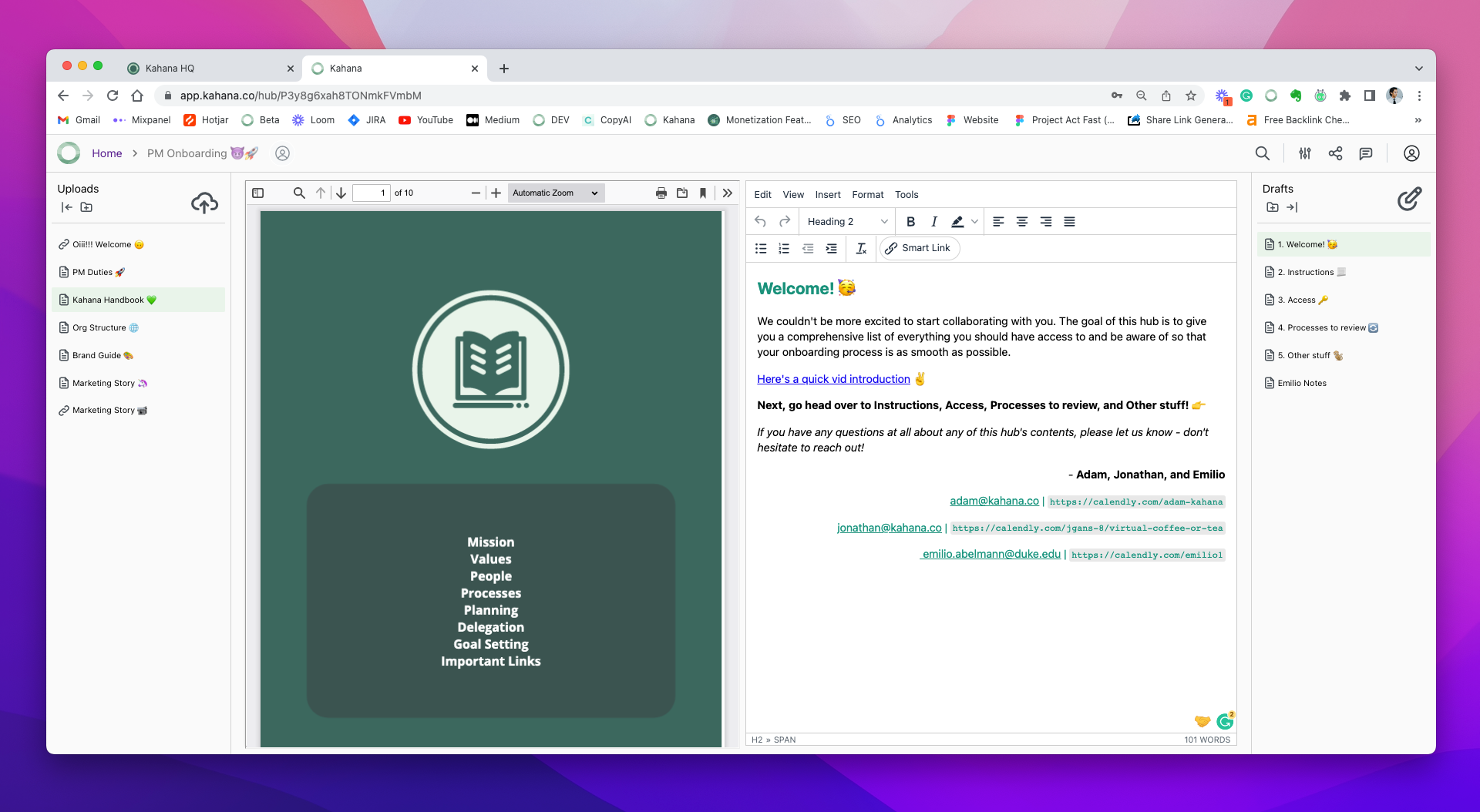Employee Satisfaction Research: PDF Library & Guide

Topics covered ✅
- Improving Company Performance
- Satisfied Employees
- Employee Engagement Survey
- Office Life
- Career Development
- Organization Values
Let's face it: employee satisfaction matters. It matters to your employees, and it matters to you. So, what exactly is the link between employee satisfaction and retention?
- What questions should you ask to ensure that your employees are satisfied?
- How do you know if they are engaged?
- How can you make sure they're getting the career development they want?
In this article, we'll touch on each of these topics and more so that you can start making changes in your workplace today.
1. The Secret to Improving Company Performance
We are here to help. We've got all the tools you need to make sure you're getting the most out of your employees and ensuring that they are being treated fairly and well.
It affects employee engagement, which in turn affects turnover, morale, and productivity.
Employee satisfaction research is used to measure how happy employees are with their experiences. They can also be used to assess whether the employer is meeting their needs.
We'll be throwing lots of information at you, so grab a pen and a notepad and buckle up for the ride.

Claim My Free PDF Library
This hub is a ready-made, cloud-based library of PDFs and resources that will help you conduct employee satisfaction research. No download or local storage is necessary.
2. How Do You Measure the Level of Happiness of Your Employees?
You may be asking, what is the best step to improving employee satisfaction? Well, a survey is a fantastic place to start! Employee satisfaction survey questions can help you assess your employees' satisfaction with their jobs. But how exactly do you measure this? And why is it important to your company's success?
Research has shown that satisfied employees are more engaged, loyal, and productive. Satisfied employees are more likely to stay with your company. That's why it's so important to (regularly) survey your employees on their satisfaction levels, as well as find ways to improve their happiness at work. The best way to do this is through an employee satisfaction survey template.
An employee satisfaction survey template allows you to gather data from multiple sources and determine how your employees feel about various aspects of their jobs. For example, you can ask them whether they feel like they have enough opportunities for growth within the company or if they feel like they have enough support from management when they need it. When you compare these answers against other metrics like retention rates or engagement scores, you'll be able to see what areas need improvement and make changes accordingly.
Employee engagement surveys are a great way to tap into the positive feelings and emotions of your workforce. The more engaged employees are in their work, the more likely they are to take on new challenges and see results from their efforts. The best part is that these surveys not only benefit the company but also make employees feel like they're part of something bigger than themselves. When they're willing to go above and beyond for the good of the group, it will ultimately lead to better management of projects, higher quality products/services, and bottom-line profits!
Different types of surveys for research can ultimately be leveraged online or in person. They should ask questions that relate specifically to the workplace and the employer's policies. Employees should also be asked questions about their career development and training opportunities.
Companies can also use these surveys as an opportunity for feedback on areas that need improvements, such as employee retention rates or workplace culture. It's important to take answers seriously when developing policies around these issues.
While employee surveys are a great way to get feedback from your employees, it's important to note they also can be time-consuming and expensive. Furthermore, they don't allow you to get immediate feedback from the employee regarding their satisfaction or engagement. It’s all about finding the right balance between using these surveys to be as efficient as possible when distributing them.
Overall, employee surveys will help you learn very useful information about your company and more. They collect comprehensive feedback about your employees' satisfaction with their job, their work environment, and their compensation. The results will present an easy-to-digest report with actionable insights into how you can improve your bottom line. In turn, you can make simple changes to your policies and procedures—all while improving employee morale among your workforce!
3. Employee Engagement Survey
Employee satisfaction surveys can help employers understand what it's like for their employees to work for them and how to improve satisfaction. But how do you get started?
The first step is deciding what you want to measure. You may want to survey your employees about:
- The overall quality of their work experience
- How much autonomy do they have in their role?
- The opportunities available for career development or advancement
- How often do they receive feedback from managers or colleagues
- What do they like most about working at your organization? (and what they don't like?)
Other questions should cover topics that touch on categories such as collaboration, communication, company leadership, consumer focus, inclusion, performance, work processes, etc. The best way to organize these questions is to look up an employee engagement survey template - or just a survey template in general - and this will give you a great base to start with.
The most important thing to keep in mind when conducting employee satisfaction surveys is how you can make sure that the survey results are useful and actionable for your business.
Employee satisfaction is a serious issue and one that affects all facets of a business. From the company’s bottom line to the employees’ well-being, employee satisfaction matters. Therefore, an easy way to get the ball rolling on employee satisfaction surveys is by creating a survey template for yourself. You can use the template as a starting point for creating your own survey, then add questions based on what's most important for your organization. It can also help you identify areas where you can do more to engage your employees, so they feel like their work experience is meaningful and fulfilling.
Hopefully, these steps above can help jumpstart the brainstorming process and can give you a great idea of what direction you should head in.
4. How Employee Satisfaction Can Improve Office Life
Employee satisfaction is a big deal. If you have a highly engaged workforce, you'll have reduced employee turnover rates and increased productivity. You'll also be able to cultivate a culture of knowledge sharing and gain collective experience.
And if you don't have a highly engaged workforce?
Well, let's just say that's not good for anyone. It's important to know whether your employees are satisfied with their jobs and their work environment because it affects so many aspects of your business: from employee retention and performance to morale, engagement, and productivity.
It's the difference between having a team that is engaged and motivated or one that's disengaged and unhappy. It's the difference between losing good employees to competitors who offer better compensation or career development opportunities and keeping them on board with a culture of appreciation and respect. You can't afford to not know what your employees want, or how they feel about working for you.
Why? Because happy employees are more productive, have higher retention rates, and are more likely to do their best work. When employees feel valued and respected, they're willing to go the extra mile for their employer.
Studies have shown that employees who feel satisfied with their job also feel more engaged with them, which leads them to stay longer at the company and do better work than those who do not feel valued or appreciated by their employers. For Example, according to the Society for Human Resource Management (SHRM) report on Employee Job Satisfaction and Engagement, employee satisfaction is a key driver of retention and engagement. In fact, over half of all employees who are satisfied with their workplace will stay with the company for at least three years.
In today’s day and age, the environment of a workplace is one of the most (if not the most) important reasons why someone would choose to work for your company. It is a recent trend to have fun and exciting things to do in an office. Take a look at major companies like Google or Apple, which have some of the most elaborate and crazy office spaces that this world has ever known. Now, we are not saying you have to go all out like them, but taking small steps in creating a friendly and innovative workspace is great for employee stratification and can even increase creativity and productivity within the company.
5. How Employee Satisfaction Assists Career Development
Employee satisfaction is an indication of how well your organization meets its employees' needs. If you're able to meet those needs—whether that means providing career development opportunities or creating a work environment where people feel valued—you'll have happier employees who stick around longer.
We've got a few suggestions:
- Ask your employees questions about career development opportunities and what you can do to help them grow as individuals within your company. It's important that you let them know that there's room for growth and advancement within the organization.
- Ask how satisfied they are with their current job and if there's anything that could improve it for them personally on a daily basis (i.e., access to coffee breaks). Be sure not to pry too much—you don't want to come across as nosy or controlling! Just ask simple questions like "How do you feel about this new project?" or "What do you think about our new uniforms?" so you can get some idea of what kinds of things might need improvement in order for them to feel even more engaged with their work environment.
- A big tip that we can give you is to not take the process or results too personally. You need to be aware that you will get some negative employee feedback, but a cardinal rule is that harsh criticism is necessary, especially if you want to advance your company to a whole new level and set it apart from the rest.
6. Aligning Your Career with Values
Employee engagement is a critical aspect of any successful business. It's important to keep your employees engaged and happy because it's been shown that happy employees are more productive and less likely to leave your organization. The best way to do this is by asking them what they want from their jobs, and then working with them to make sure you're providing what they need.
For example, if you have lots of remote employees or work in an industry where turnover is high, then you might want to focus on questions related to career development opportunities and training programs. If turnover isn't a concern but employee retention is high on your list of priorities, then maybe instead focus on questions related to how satisfied employees feel about their current roles within the company and how confident they feel about their futures with said company (i.e., "How satisfied are you with your current role?" or "Do you feel supported by management?").
Every company has its own personal values and morals that they are founded on. Therefore, take the necessary steps in recognizing and understanding what yours are. It could be accountability. It could be integrity or honesty. It even could even be having fun. Wherever it is, make sure you're aligning your company values with employee stratification. These two need to intermix in order to form the company you've always dreamed of running.
Overall, employee satisfaction is a measure of how satisfied employees are with their jobs, managers, colleagues, and the company as a whole. It's an important indicator of how productive your workers will be and how likely they are to stay with your company. Creating a quick and easy survey can help your company in immense ways by truly learning about the inside secrets of how your company works and what steps you can take to achieve total and ultimate satisfaction.

Talk with a Kahana representative
Fill out your information and a Kahana team representative will reach out to you. Have a simple question? Search our library of articles


